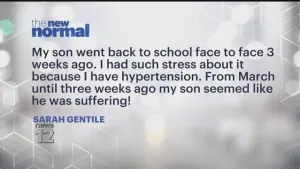UK, US, Canada accuse Russia of hacking virus vaccine trials
Britain, the United States and Canada say Russia is trying to steal information from researchers seeking a COVID-19 vaccine.
•
Jul 16, 2020, 1:17 PM
•
Updated 1,872 days ago
Share:
More Stories
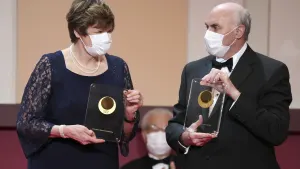
Nobel in medicine goes to 2 scientists whose work enabled creation of mRNA vaccines against COVID-19
699ds ago1:25

Pharmacies say they have not received orders for newest COVID booster
704ds ago0:21

Biden administration announces $600M to produce COVID tests and will reopen website to order them
710ds ago0:41

Gov. Hochul: Updated COVID-19 vaccine to be available in NY in the coming days
718ds ago2:13
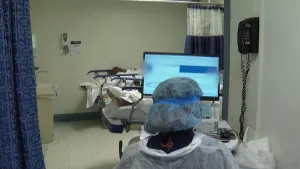
NYSDOH: COVID numbers up with new variant accounting for 17% of new cases
752ds ago2:30
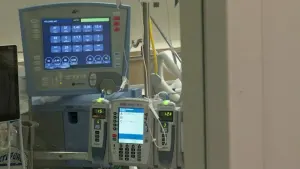
NYSHD: Hospitalizations caused by COVID increase by 22% in a week
759ds ago
Nobel in medicine goes to 2 scientists whose work enabled creation of mRNA vaccines against COVID-19
699ds ago1:25

Pharmacies say they have not received orders for newest COVID booster
704ds ago0:21

Biden administration announces $600M to produce COVID tests and will reopen website to order them
710ds ago0:41

Gov. Hochul: Updated COVID-19 vaccine to be available in NY in the coming days
718ds ago2:13

NYSDOH: COVID numbers up with new variant accounting for 17% of new cases
752ds ago2:30

NYSHD: Hospitalizations caused by COVID increase by 22% in a week
759ds ago
Britain, the United States and Canada say Russia is trying to steal information from researchers seeking a COVID-19 vaccine.
The three nations alleged Thursday that hacking group APT29, also known as Cozy Bear and said to be part of the Russian intelligence service, is attacking academic and pharmaceutical research institutions involved in coronavirus vaccine development.
The persistent and ongoing attacks are seen by intelligence officials as an effort to steal intellectual property, rather than to disrupt research.
Britain’s National Cybersecurity Centre made the announcement, which was coordinated with authorities in the U.S. and Canada.
It was unclear whether any information actually was stolen but the National Cypersecurity Centre says individuals’ confidential information is not believed to have been compromised.
The three nations alleged Thursday that hacking group APT29, also known as Cozy Bear and said to be part of the Russian intelligence service, is attacking academic and pharmaceutical research institutions involved in coronavirus vaccine development.
The persistent and ongoing attacks are seen by intelligence officials as an effort to steal intellectual property, rather than to disrupt research.
Britain’s National Cybersecurity Centre made the announcement, which was coordinated with authorities in the U.S. and Canada.
It was unclear whether any information actually was stolen but the National Cypersecurity Centre says individuals’ confidential information is not believed to have been compromised.
MORE: President Trump hopeful to have COVID-19 vaccine on market by year's end
Cozy Bear has been identified by Washington as one of two Russian government-linked hacking groups that broke into the Democratic National Committee computer network and stole emails ahead of the 2016 presidential election. The other group is usually called Fancy Bear.
It's also unclear whether Russian President Vladimir Putin knew about the vaccine research hacking, but British officials believe such intelligence would be highly prized.
U.S. authorities have for month leveled similar accusations against China. FBI Director Chris Wray said last week, “At this very moment, China is working to compromise American health care organizations, pharmaceutical companies, and academic institutions conducting essential COVID-19 research.”
Cozy Bear has been identified by Washington as one of two Russian government-linked hacking groups that broke into the Democratic National Committee computer network and stole emails ahead of the 2016 presidential election. The other group is usually called Fancy Bear.
It's also unclear whether Russian President Vladimir Putin knew about the vaccine research hacking, but British officials believe such intelligence would be highly prized.
U.S. authorities have for month leveled similar accusations against China. FBI Director Chris Wray said last week, “At this very moment, China is working to compromise American health care organizations, pharmaceutical companies, and academic institutions conducting essential COVID-19 research.”
By JILL LAWLESS and DANICA KIRKA
Copyright 2020 The Associated Press. All rights reserved. This material may not be published, broadcast, rewritten or redistributed without permission.
More from News 12
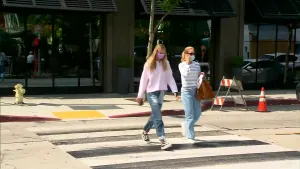
Experts warn COVID-19 cases could surge as winter comes closer
26:36
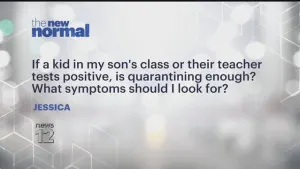
Dr. Sharon Nachman discusses the rise in coronavirus cases among children as schools begin to reopen
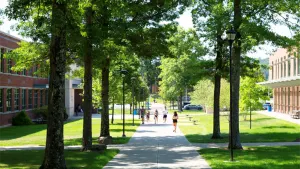
SUNY chancellor: Testing advancements to allow 100% COVID-19 testing capacity on campuses
2 weeks, 4 days, 17 hours

Marty Cantor discusses August unemployment numbers and unemployment benefits
2 weeks, 4 days, 20 hours
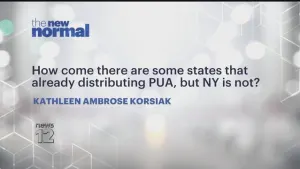
Is the economic recovery from the pandemic slowing? Marty Cantor answers viewers' questions
